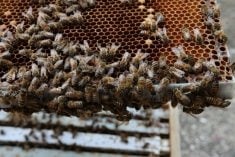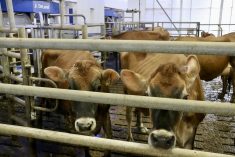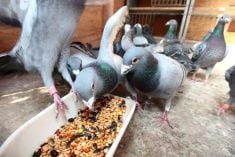A new bee health tool has the g0-ahead be sold in Canada.
ApiSave Health, the brainchild of ApiSave Bee Health Sciences out of Port Coquitlam, B.C., has gotten Health Canada’s approval as a veterinary health product (VHP). The key ingredient of the product, a hops-based organic plant extract, has been added to Health Canada’s list of permitted substances.
Why it matters: ApiSave hopes to eventually hit the market with a pesticide against common bee threats, but first decided to focus on the less cumbersome veterinary health product approval.
Read Also

JBS profit falls amid still-challenging US market environment
JBS, the world’s largest meat company, reported a net profit fall in the third quarter in spite of a rise in global net sales amid a still-challenging beef market environment in the U.S., according to an earnings statement on Thursday.
“This is a major milestone for our company,” wrote Russ Crawford, vice-president of business development with ApiSave, in an email.
ApiSave Health is intended to boost bees’ immune systems.
It’s a needed product, the company argues, pointing to widespread bee colony losses throughout Canada, the United States and elsewhere.
According to the Canadian Association of Professional Apiculturists, which has reported on winter bee colony losses since 2007, average losses have averaged 32.2 to 45.5 per cent in the last four years. In 2022, losses were almost twice the long-term average.
This spring, the United States in particular posted serious bee losses. Survey results shared by the Honey Bee Health Coalition noted that, of the 702 beekeepers canvassed, mid-sized operations (50 to 500 colonies) averaged 54 per cent colony loss from June 2024 to February 2025.
Commercial operations (over 500 colonies) reported 62 per cent loss on average.
Future pesticide applications
ApiSave claims the extract is also able to control foulbrood pathogens and varroa mites, both major thorns in the sides of beekeepers.
The company hopes to one day market their extract in a second product based on that premise.
For now, however, approval is limited to the company’s health booster. The regulatory fate of that eventual pesticide, coined with the name ApiSave Varroa, will be in the hands of Health Canada’s Pest Management Regulatory Agency (PMRA).
The company recently placed first in a pitch night held by Edmonton-based Startup TNT. Winners of the competition typically win around $200,000 in investment funding.
In a recent interview with the Manitoba Co-operator, Rod Scarlett, executive director of the Canadian Honey Council, expressed cautious optimism over ApiSave’s potential for his sector.
“The toolkit for beekeepers is getting so precariously low, any introduction of a product that has a semblance of effectiveness is going to be welcomed by beekeepers,” he said.















